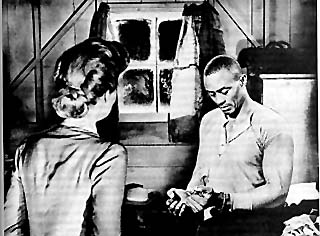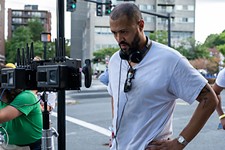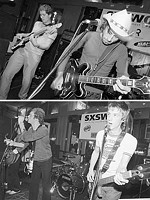Sergeant Rutledge
John Ford's Sergeant Rutledge, about the trial of a black Army officer accused of murder and rape, has a striking, formal sort of beauty.
Reviewed by Jerry Renshaw, Fri., July 20, 2001

SERGEANT RUTLEDGE
D: John Ford (1960); with Jeffrey Hunter, Constance Towers, Woody Strode, Billie Burke,
Juano Hernandez, Willis Bouchey, Carleton Young.
By 1960, deep and fundamental changes were afoot in American society. Those changes were not lost on director John Ford; though Ford's politics were quintessentially conservative, he resented any hints that he might also be a bigot. Sergeant Rutledge was Ford's response. The U.S. Cavalry's "buffalo soldiers" were mainly freed slaves; their name was an Indian term that came from their ability to hide under buffalo skins in the snow. They had proven themselves in battle as fearless and resourceful soldiers. The script from Willis Goldbeck and James Warner Bellah sets up Sergeant Braxton Rutledge as a suspect in the murders of an Army Major and his teenage daughter and her rape. As Mary Beecher, Towers plays the only eyewitness to what happened, and the only hope of clearing Rutledge's name. Hunter's performance is especially good as the lieutenant who serves as both Rutledge's defense lawyer and commanding officer. Torn between loyalty to his friend and duty to the Army's regulations, Hunter brings real depth to the character of Lieutenant Cantrell. For the role of the accused, Ford rejected Harry Belafonte and Sidney Poitier as both being too handsome, in favor of Woody Strode. The 6-foot-4 Strode was a superlative athlete and could bring a commanding physical presence to the screen; the only problem was that he couldn't ride and could barely act. Ford was willing to invest the time in riding lessons for Strode, but rather than assign an acting coach, the director got in front of the camera himself and showed Strode exactly how his character was to be played. True to his reputation as a merciless martinet, Ford would stop at nothing to get the performance he wanted out of Strode, whether that meant slugging him, stomping on his feet, throwing rocks at him, insulting him, or even swatting him with a rifle butt. One evening the director brought Strode to the house of Pat Ford and got him drunk until he passed out; on the next day's shoot, he harangued him relentlessly while the badly hung over Strode tried to pull himself together. The next day, there was a crucial courtroom scene wherein Rutledge was accused by the prosecutor of having deserted his company. Strode's line was: "The Ninth Cavalry is my home and my self-respect. If I had deserted them, I wouldn't be nothin' but a swamp-runnin' nigger. And I ain't that; I'm a man." It's an incredibly powerful and moving scene, with Strode's huge, totemic presence dominating the screen. Ford had the actor repeat the scene over and over until by the final take, Strode broke down in tears; Ford's response was, "Now Woody, stop those tears. It's a sign of weakness." Not surprisingly, Sergeant Rutledge fared miserably at the box office. Still, the film has a striking, formal sort of beauty, and with the glorious landscapes of Ford's Monument Valley, the lyrical camera work of Bert Glennon, and the claustrophobic court martial scenes, it turned out to be a personal triumph for Ford, Strode, Towers, and all involved. The bond between Strode and Ford continued for years, with the director ludicrously casting him as an Indian chief in Two Rode Together and a Mongol warrior in 7 Women. Further, Strode turned out to be one of the director's favorite tools for needling John Wayne; Ford would remark, "Now, there goes a real football player, Marion" and would pointedly refer to Strode's WWII service. Undoubtedly John Ford was one of the few men who could get by with addressing Wayne in such a way. In Strode's own words: "[Sergeant Rutledge] was a classic. It had dignity. John Ford put classic words in my mouth. You have never seen a Negro come off a mountain like John Wayne before. I had the greatest Glory Hallelujah ride across the Pecos River that any black man ever had on the screen. And I did it all myself. I carried the whole black race across that river."










